人教版九年级英语unit 4重点短语句型语法+配套试题(答案)
初中英语人教新目标九年级Unit 4重点单词短语句型默写练习(附参考答案)
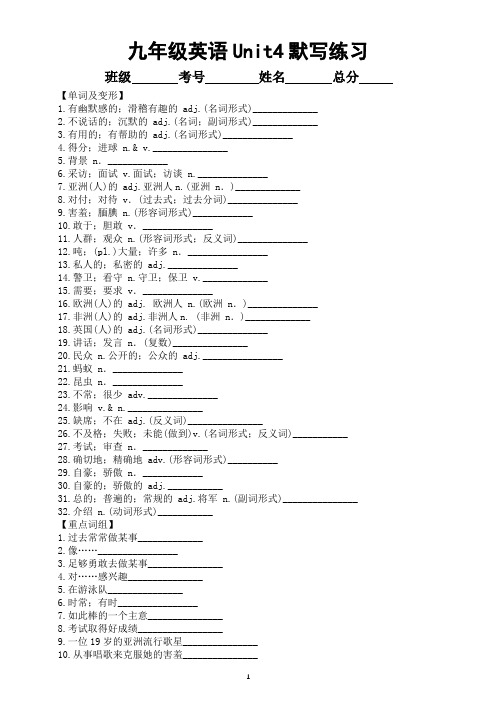
九年级英语Unit4默写练习班级考号姓名总分【单词及变形】1.有幽默感的;滑稽有趣的 adj.(名词形式)_____________2.不说话的;沉默的 adj.(名词;副词形式)_____________3.有用的;有帮助的 adj.(名词形式)______________4.得分;进球 n.& v._______________5.背景 n.____________6.采访;面试 v.面试;访谈 n.______________7.亚洲(人)的 adj.亚洲人n.(亚洲 n.)_____________8.对付;对待 v.(过去式;过去分词)______________9.害羞;腼腆 n.(形容词形式)____________10.敢于;胆敢 v.______________11.人群;观众 n.(形容词形式;反义词)______________12.吨;(pl.)大量;许多 n.________________13.私人的;私密的 adj.______________14.警卫;看守 n.守卫;保卫 v._____________15.需要;要求 v.______________16.欧洲(人)的 adj. 欧洲人 n.(欧洲 n.)______________17.非洲(人)的 adj.非洲人n. (非洲 n.)_____________18.英国(人)的 adj.(名词形式)______________19.讲话;发言 n.(复数)_______________20.民众 n.公开的;公众的 adj.________________21.蚂蚁 n.______________22.昆虫 n.______________23.不常;很少 adv.______________24.影响 v.& n._______________25.缺席;不在 adj.(反义词)_______________26.不及格;失败;未能(做到)v.(名词形式;反义词)___________27.考试;审查 n._____________28.确切地;精确地 adv.(形容词形式)__________29.自豪;骄傲 n.____________30.自豪的;骄傲的 adj.___________31.总的;普遍的;常规的 adj.将军 n.(副词形式)_______________32.介绍 n.(动词形式)___________【重点词组】1.过去常常做某事_____________2.像……________________3.足够勇敢去做某事_______________4.对……感兴趣_______________5.在游泳队_______________6.时常;有时________________7.如此棒的一个主意_______________8.考试取得好成绩_________________9.一位19岁的亚洲流行歌星_______________10.从事唱歌来克服她的害羞_______________11.敢在她的同学面前唱歌_________________12.不再……________________13.一直_______________14.无论我走到哪儿都能吸引大量注意_______________15.担心某事/某人_____________16.小心……_______________17.准备好放弃你的正常生活______________18.想着放弃______________19.奋力坚持下去______________20.少数的______________21.攀上成功之巅________________22.读关于欧洲历史的书_____________23.害怕一个人待着______________24.公开演讲_____________25.其他昆虫_____________26.对……感到紧张______________27.逃课_______________28.考试不及格_______________29.做决定_____________30.建议某人做某事______________31.亲自______________32.坐24小时的火车______________33.对……感到骄傲______________34.在过去的几年里________________35.对某人有很大的影响_____________36.在工作面试中做一个大概的自我介绍____________37.篮球比赛打得好_____________【重点句型】:1.葆拉过去真的很安静。
人教版九年级下册英语 Unit 4 知识点总结+单元测试卷( 含答案)
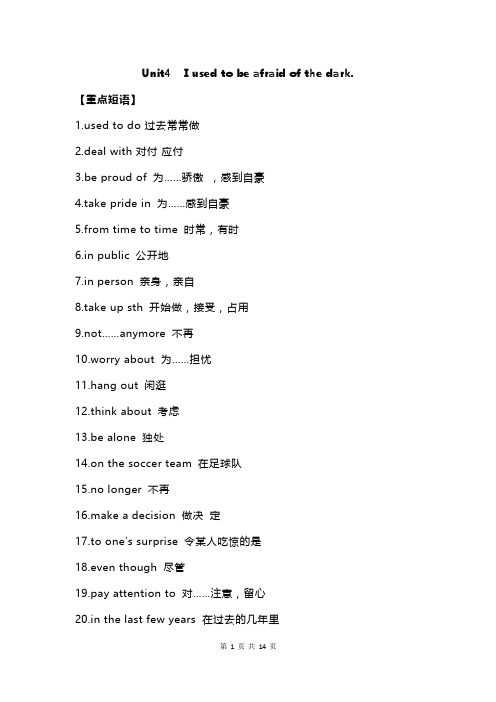
Unit4 I used to be afraid of the dark.【重点短语】ed to do 过去常常做2.deal with 对付应付3.be proud of 为……骄傲,感到自豪4.take pride in 为……感到自豪5.from time to time 时常,有时6.in public 公开地7.in person 亲身,亲自8.take up sth 开始做,接受,占用9.not……anymore 不再10.worry about 为……担忧11.hang out 闲逛12.think about 考虑13.be alone 独处14.on the soccer team 在足球队15.no longer 不再16.make a decision 做决定17.to one’s surprise 令某人吃惊的是18.even though 尽管19.pay attention to 对……注意,留心20.in the last few years 在过去的几年里21.be afraid of 害怕22.turn red 变红23.tons of attention 很多关注24.be careful 当心25.give up 放弃26.a very small number of …极少数的……27.give a speech 作演讲28.all the time 一直总是29.be interested in 对……感兴趣30.change one’s life 改变某人的生活31.take care of 照顾32.one of…, ……之一【重点句型】1. I used to be afraid of the dark.我过去常常前害怕黑暗.2.I go to sleep with my bedroom light on.我开着卧室的灯睡觉.3. I used to spend a lot of time playing games with my friends. 以前我常常花很多时间和我的朋友们玩游戏.4. I hardly ever have time for concerts.我几乎没有时间去听音乐会.5. My life has changed a lot in the last few years.我的生活在过去几年里改变了很多.6. It will make you stressed out.那会使你紧张的.7. It seems that Yu Mei has changed a lot.玉梅似乎变化很大.Unit4单元测试卷笔试部分Ⅳ.单项选择16.______ the money that Mr Brown ______,poor Mary could go back to school again.A.In; offered B.With; offeredC.In; was offered D.With; was offered17.Don t worry!I m sure you ll ______your classmates if you are kind and friendly to them.A.catch up with B.agree withC.get on well with D.make friend with18.—What a hard problem!—Ask Mary.Maybe she has ______ with a good idea about it.A.come up B.ended upC.met up D.kept up19.—______ his car is broken?—He has to walk there.A.What if B.What aboutC.Do you know D.Even though20.—Each year, ______ fishes are killed by the polluted water and many people are made sick by the polluted air.—So we should do something to stop it!A.millions of B.million ofC.two millions of D.two millions21.We should have ______ in ourselves and we will make it if we have a try. A.success B.confidenceC.progress D.knowledge22.There are ______ books on the shelf.A.plenty of B.a lotC.a plenty of D.a good many of23.Miss Yang always helps others.She is very ______.A.careful B.gratefulC.useful D.helpful24.The rest of the students ______ not allowed to leave the classroom at that time.A.are B.haveC.was D.were25.I ______ read some good books than watch a bad TV program.A.would rather B.would likeC.had better D.prefer toⅤ.完形填空Everyone needs friends.We all like to feel close to someone.__26__is nice to have a friend to talk, laugh, and do things with.__27__,sometimes we need to be alone.We don t always want people around.But we would feel lonely if we __28__had a friend.No two people are just the same.Friends__29__don t get on well.That doesn t mean that they no longer like __30__.Most of the time they will make up and become__31__again.Sometimes friends move away.Then we feelvery__32__.We miss them very much, but we can call them and write to them.It could be that we would even see them again.And we can __33__new friends.It is surprising to find out how much we like new people when we get to know them.There s more good news for people who have friends.They live longer than people who don t.Why?It could be that they are__34__.Being happy helps you stay well.So remember to bring happiness to your friends in turn.If someone cares about you, you should take__35__care of him or her.26.A.It B.He C.There D.Someone27.A.Hardly B.Nearly C.Suddenly D.Certainly28.A.ever B.never C.just D.really29.A.always B.sometimes C.often D.usually30.A.each other B.others C.the others D.another31.A.friendly B.good C.pleased D.friends32.A.angry B.sad C.happy D.alone33.A.look for B.find C.make D.know34.A.happier B.stronger C.kinder D.richer35.A.less B.better C.little D.noⅥ.阅读理解AIt was a wet and stormy night.The small gentlelooking man who had come into the inn was drenched (湿透) to the skin.He made his way to the fireplace but there were several villagers warming themselves in front of the fire and he could not go near it.As he stood there, the landlord who knew him slightly welcomed him and asked him why he was looking so sad.“I have lost a purse with twenty gold florins (一种叫做弗罗林的货币) in it,” said the man.“Where did you lose it?” asked the landlord as the men who had been standing in front of the fire gathered around them.“Within a mile of this place, I m sure,” said the man.“I ll go in search of it early in the morning.Nobody is likely to travel by that road in this weather and the purse will certainly be there till morning.”“If I were you...” began the landlord.“Yes, yes, what would you have done?” interrupted (打断) the man.“But come, let us warm ourselves by the fire.See, everybody has left!Where do you think all of them could have gone in this bad weather?”“If I were you,” said the landlord, grinning, “I would have become a story writer!”36.One stormy night, a small gentlelooking man ______.A.came into the innB.could go near the fireC.lost his purseD.looked for his purse37.The gentlelooking man could not go near the fire because ______. A.several villagers were in front of the fireB.the landlord stopped himC.he made his way to other placesD.he could not walk38.The villagers______after they heard the conversation between the man and the landlord.A.became story writersB.went home togetherC.gathered around themD.went in search of the purse39.The word “grin” probably means “______”.A.低声地哭 B.气愤地说C.露齿而笑 D.大声地唱40.According to the passage, which of the following is NOT true?A.The landlord knew the small gentlelooking man.B.The landlord became a story writer at last.C.It was wet and stormy that night.D.In fact, the gentlelooking man didn t lose his nurse.BWelcome to Tonglin Hotel.We will offer you the best service, so that you can have a pleasant stay here.Room Service:You can use room service 24 hours a day.Phone the Information Desk, and your message will be passed on to the room waiter.Dining Room:You can have three meals a day in the dining room.Breakfast is offered from 8:00 am to 9:30 am.Also the room waiter may bring breakfast to your room at any time after 7:00 am.If you need breakfast, please fill out a card and hang it outside your door before 6:00 am.Lunch is from 12:00 to 2:00 pm.Dinner is from 6:30 pm to 8:30 pm.Telephones:To make a phone call, you should dial (拨号) “0” for the Information Desk to put you through to the room waiter.There are also public telephones near the Information Desk.Tell the Information Desk if calls are needed.Shop:The hotel shop is open from 9:00 am to 5:30 pm.Coffee House:You can drink coffee here at the following times:12:00 2:00 pm8:00 pm 1:30 amOther Services:There is a cinema in the hotel.Films begin at 7:00 pm on Sundays and Wednesdays.Hot water is offered 24 hours a day.There is also a big swimming pool in the hotel.You can enjoy yourself at any time you like.It is free.41.You would see this notice______.A.in a hotel shopB.in a bedroom of a large hotelC.in a hotel dining roomD.on the door of a small hotel42.What would you do if you want room service at night?A.Fill out a card.B.Phone the room waiter.C.Go to the Information Desk.D.Phone the Information Desk.43.If you want to have your breakfast at a quarter past seven, youshould______.A.phone the Information DeskB.go to the hotel dining roomC.go to the coffee house to have itD.put a message outside your room before 6:00 am44.If you want to have two hours talk in the coffee house, you may gothere at______.A.1:00 pm B.12:30 pmC.10:00 pm D.11:30am45.The notice tells us that we can______.A.see a film whenever we want toB.go to the coffee house once a weekC.go shopping at any time in the hotelD.swim in the pool without paying moneyCZhang Hongying, girl, 15I want to make our lunch time longer.At the moment, lunch time is short.Most of my classmates would like to do their homework during this time.But if they don t get a good rest, they won t have enough energy for the aftern oon.So I would like to have more time so that we can take a nap after lun ch.That way, we ll learn better in the afternoon.Zhao Pengran, girl, 15I would like to have more chances to talk in English.Now, the English class es are not enough for us to practice speaking English.I think we d better ha ve one morning a week at least to have spoken English lessons in order to improve our English.Zhou Jiancheng, boy, 15My idea would be to have more fashionable school uniforms.If I were the h eadmaster, I would ask the students to design the uniforms themselves.We c ould have a contest among student designers.Then, we could ask others to c hoose their favorite.This way, we ll be able to wear what we like best.How nice it would be for us young people!以上为某学校通过校长意见箱收集到的一些学生的意见和建议。
英语九年级Unit4重点短语和句子(答案)
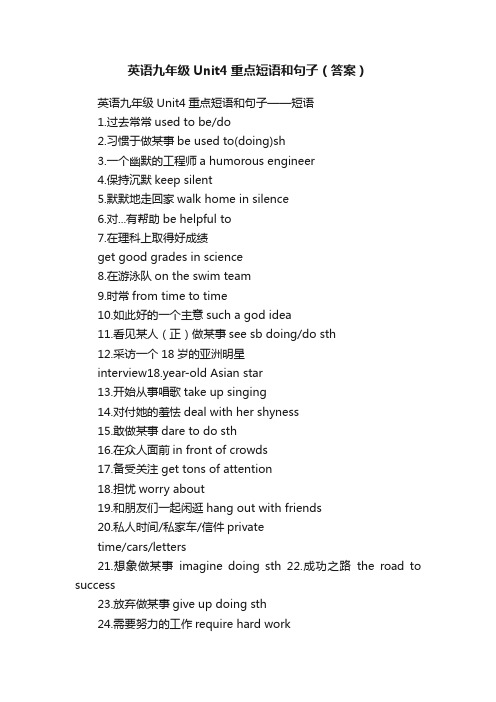
英语九年级Unit4重点短语和句子(答案)英语九年级Unit4重点短语和句子——短语1.过去常常used to be/do2.习惯于做某事be used to(doing)sh3.一个幽默的工程师a humorous engineer4.保持沉默keep silent5.默默地走回家walk home in silence6.对...有帮助be helpful to7.在理科上取得好成绩get good grades in science8.在游泳队on the swim team9.时常from time to time10.如此好的一个主意such a god idea11.看见某人(正)做某事see sb doing/do sth12.采访一个18岁的亚洲明星interview18.year-old Asian star13.开始从事唱歌take up singing14.对付她的羞怯deal with her shyness15.敢做某事dare to do sth16.在众人面前in front of crowds17.备受关注get tons of attention18.担忧worry about19.和朋友们一起闲逛hang out with friends20.私人时间/私家车/信件privatetime/cars/letters21.想象做某事imagine doing sth 22.成功之路the road to success23.放弃做某事give up doing sth24.需要努力的工作require hard work25.很少一部分/...的数量a small number of/the number of26.关于欧洲历史的书籍books on European history27.非洲文化African culture28.英式英语/美式英语”British English/American English29.至少/顶多at least/at most30.蚂蚁和其他昆虫ants and other insects31.公开地演讲give a speech in public32.很少上课迟到be seldom late for class33.影响他的学业influence his schoolwork34.旷课/工be absent from class(es)/work35.考试不及格fail the exam36.一家寄宿学校a boarding school37.亲自in person38.以...骄傲(两种)take pride in/be proud of 39做一个常规的自我介绍give a general self-introduction40.对...有重大影响have a great influence on英语九年级Unit4重点短语和句子——句子1我过去怕黑。
2019年秋人教九年级Unit 4重点单词、短语和句子专练(含答案)
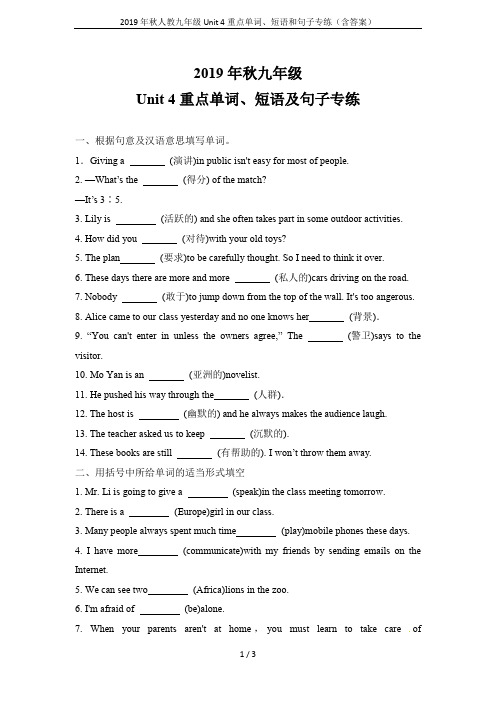
2019年秋九年级Unit 4重点单词、短语及句子专练一、根据句意及汉语意思填写单词。
1.Giving a (演讲)in public isn't easy for most of people.2. —What’s the (得分) of the match?—It’s 3∶5.3. Lily is (活跃的) and she often takes part in some outdoor activities.4. How did you (对待)with your old toys?5. The plan (要求)to be carefully thought. So I need to think it over.6. These days there are more and more (私人的)cars driving on the road.7. Nobody (敢于)to jump down from the top of the wall. It's too angerous.8. Alice came to our class yesterday and no one knows her (背景).9. “You can't enter in unless the owners agree,”The (警卫)says to the visitor.10. Mo Yan is an (亚洲的)novelist.11. He pushed his way through the (人群).12. The host is (幽默的) and he always makes the audience laugh.13. The teacher asked us to keep (沉默的).14. These books are still (有帮助的). I won’t throw them away.二、用括号中所给单词的适当形式填空1. Mr. Li is going to give a (speak)in the class meeting tomorrow.2. There is a (Europe)girl in our class.3. Many people always spent much time (play)mobile phones these days.4. I have more (communicate)with my friends by sending emails on the Internet.5. We can see two (Africa)lions in the zoo.6. I'm afraid of (be)alone.7. When your parents aren't at home,you must learn to take care of(you).8. This is (exact)what I want. Thank you very much.9. She really has got used to (study)in this new school.10. Miss White teaches (Britain)English in that school.三、用方框中所给短语的适当形式填空A1. We have _______________ homework to do today.2. Jim is a quiet boy. He stays at home .3. He left school last year. He a student .4. He be short and thin but now he's tall and fat.5. His mother is ill at home so he look after her every day.B6. Why don't you come here_____________?7. His parents found jobs in Wuhan,so they __________.8. He couldn't come to the party because he had to ___________his brother.9. ________________,my phone call changed his life.10. The teacher made me ________________ my pronunciation next time.四、根据汉语意思完成句子1.尽管你已通过了考试,但你还是应该继续努力学习。
人教版九年级英语Unit4知识点精讲和练习题.doc
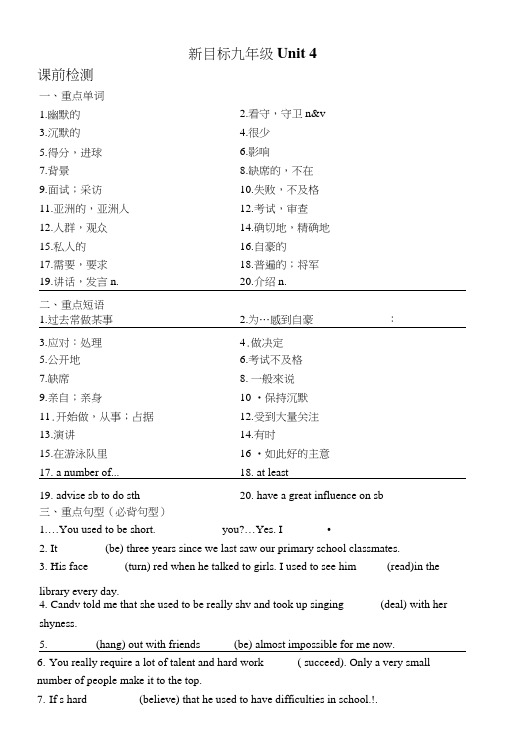
新目标九年级Unit 4课前检测一、重点单词1.幽默的2.看守,守卫n&v3.沉默的4.很少5.得分,进球6.影响7.背景8.缺席的,不在9.面试;采访10.失败,不及格11.亚洲的,亚洲人12.考试,审查12.人群,观众14.确切地,精确地15.私人的16.自豪的17.需要,要求18.普遍的;将军19.讲话,发言n. 20.介绍n.二、重点短语1.过去常做某事2.为…感到自豪:3.应对:处理4.做决定5.公开地6.考试不及格7.缺席8. 一般來说9.亲自;亲身10 •保持沉默11.开始做,从事;占据12.受到大量关注13.演讲14.有时15.在游泳队里16 •如此好的主意17. a number of... 18. at least19. advise sb to do sth 20. have a great influence on sb三、重点句型(必背句型)1.…You used to be short. you?…Yes. I •2. It (be) three years since we last saw our primary school classmates.3. His face (turn) red when he talked to girls. I used to see him (read)in the library every day.4. Candv told me that she used to be really shv and took up singing (deal) with her shyness.5. (hang) out with friends (be) almost impossible for me now.6.You really require a lot of talent and hard work _____ ( succeed). Only a very small number of people make it to the top.7.If s hard ________ (believe) that he used to have difficulties in school.!.8.Sometimes he was absent from classes and ______ ( fail) his examinations.9.She advised them _______ (talk) with their son in person.10.My life _________ (change) a lot in the last few years.四、重点语篇From Shy Girl to Pop StarThe Young World magazine i _______ 19-year-old pop star Candy Wang, who used to be shy and t ____ up singing to deal with her s ___ ・ Now she d ___ t o sing in front of thew ____ school and crowds. And she gets t ____ of attention everywhere she goes. However, she has to be very c _______ about w ___ I say or do. And she doesn^t have much p _______ time anymore. ______ (hang) out with friends is almost i __________ b ecause of the guards. Also, being a singer is difficult and people have to be prepared ____________ (give) up their normal life. It r ______ a lot of talent and hard work. Only a very small number of peoplem ___ it to the top.He Studies Harder Than He Used toLi Wen, a 15-year-old boy from the countryside, works very hard and d _____ well in school. It is hard _______ (believe) that he used to have difficulties. When his parents moved to the city to work, he missed them so much that he often felt 1 _____ and unhappy, which greatly i _____ his schoolwork. He was sometimes a _____ from classes. Then his parents made the d ________ to send him to a boarding school. Finding the life there d ____________ , Li Wen wanted to leave the school. His teacher a ______ his parents to talk with their son in p _____ , It was e _____ what he needed. He realized that his parents would always love him and takep ____ in everything that he did. Now he is m ___ happier than he used to be.考点知识梳理ed to do sth.; be used to doing sth; be used to do sthused to do sth意为"过去常常做某事”.used to的疑问句形式是"Did…use to d o?”或"Used...to do"; used to的反意疑问句也用助动词did(n't)或used(nl)构成。
初三英语人教版第四单元讲解练习及答案Unit_4_What_would_you_do2
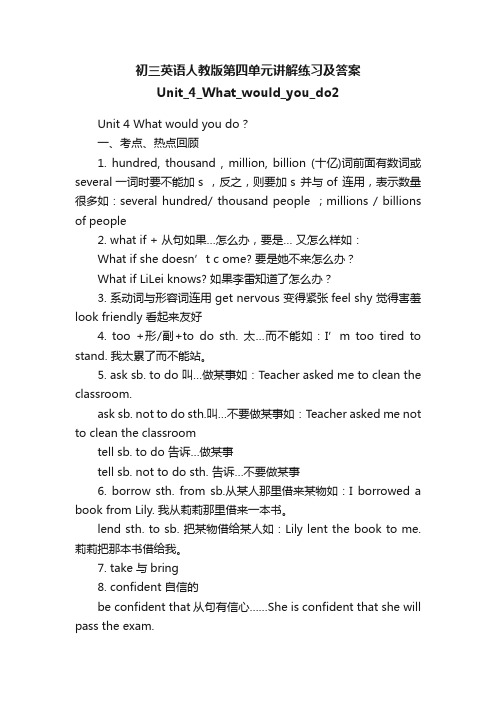
初三英语人教版第四单元讲解练习及答案Unit_4_What_would_you_do2Unit 4 What would you do?一、考点、热点回顾1. hundred, thousand , million, billion (十亿)词前面有数词或several一词时要不能加s ,反之,则要加s 并与of 连用,表示数量很多如:several hundred/ thousand people ;millions / billions of people2. what if + 从句如果…怎么办,要是… 又怎么样如:What if she doesn’t c ome? 要是她不来怎么办?What if LiLei knows? 如果李雷知道了怎么办?3. 系动词与形容词连用 get nervous 变得紧张feel shy 觉得害羞look friendly 看起来友好4. too +形/副+to do sth. 太…而不能如:I’m too tired to stand. 我太累了而不能站。
5. ask sb. to do 叫…做某事如:Teacher asked me to clean the classroom.ask sb. not to do sth.叫…不要做某事如:Teacher asked me not to clean the classroomtell sb. to do 告诉…做某事tell sb. not to do sth. 告诉…不要做某事6. borrow sth. from sb.从某人那里借来某物如:I borrowed a book from Lily. 我从莉莉那里借来一本书。
lend sth. to sb. 把某物借给某人如:Lily lent the book to me. 莉莉把那本书借给我。
7. take 与bring8. confident 自信的be confident that从句有信心……She is confident that she will pass the exam.be confident to do sth. 有信心做某事We're confident to get there on time.be confident of 对……有信心I'm confident of him.have confidence in 对……有信心We should have confidence in ourselves.9.What is he like? 他这人怎么样?What does he like?他喜欢什么?What does he look like?他长得怎么样?10.全部allwhole11.get along with 与……相处==get on withThey get along well with eacher other. 他们彼此相处地很好。
初中英语人教新目标九年级全册Unit 4填空练习(单词+短语+句型)(附参考答案)
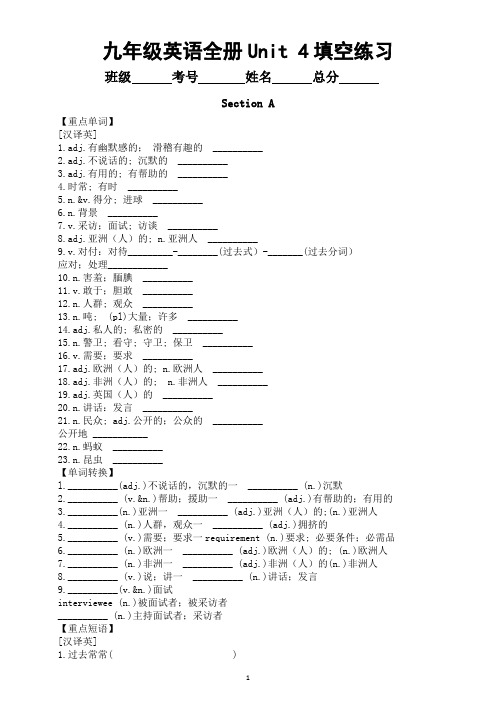
九年级英语全册Unit 4填空练习班级考号姓名总分Section A【重点单词】[汉译英]1.adj.有幽默感的;滑稽有趣的 __________2.adj.不说话的; 沉默的 __________3.adj.有用的; 有帮助的 __________4.时常; 有时 __________5.n.&v.得分; 进球 __________6.n.背景 __________7.v.采访;面试; 访谈 __________8.adj.亚洲(人)的; n.亚洲人 __________9.v.对付:对待_________-________(过去式)-_______(过去分词)应对;处理____________10.n.害羞;腼腆 __________11.v.敢于;胆敢 __________12.n.人群; 观众 __________13.n.吨; (pl)大量;许多 __________14.adj.私人的; 私密的 __________15.n.警卫; 看守; 守卫; 保卫 __________16.v.需要;要求 __________17.adj.欧洲(人)的; n.欧洲人 __________18.adj.非洲(人)的; n.非洲人 __________19.adj.英国(人)的 __________20.n.讲话:发言 __________21.n.民众; adj.公开的;公众的 __________公开地 ___________22.n.蚂蚁 __________23.n.昆虫 __________【单词转换】l.__________(adj.)不说话的,沉默的一 __________ (n.)沉默2.__________ (v.&n.)帮助;援助一 __________ (adj.)有帮助的;有用的3.__________(n.)亚洲一 __________ (adj.)亚洲(人)的;(n.)亚洲人4.__________ (n.)人群,观众一 __________ (adj.)拥挤的5.__________ (v.)需要;要求一requirement (n.)要求; 必要条件;必需品6.__________ (n.)欧洲一 __________ (adj.)欧洲(人)的; (n.)欧洲人7.__________ (n.)非洲一 __________ (adj.)非洲(人)的(n.)非洲人8.__________ (v.)说;讲一 __________ (n.)讲话;发言9.__________(v.&n.)面试interviewee (n.)被面试者;被采访者__________ (n.)主持面试者;采访者【重点短语】[汉译英]1.过去常常( )3.看到某人正在做某事( )2.时常; 有时( )5.应对; 处理( )4.学着做; 开始做( )7.在前面( )6.不再;再也不( )9.许多; 大量( )8.做演讲( )1l.闲逛( )10.当心; 小心( )13.获得成功( )l2.许多:大量( )14.公开地 ( )【重点句型】1.Mario,you ______________ short,didn't you?马里奥,你过去很矮,是吗?2.________ he ________ now? 他现在长什么样?3.The party is ______________________________!(举办)这次聚会的主意实在太棒了!4.__________________ three years since we last saw our primary school classmates.我们已经有三年没见我们的小学同学了。
人教版九年级英语第四单元语法练习(有答案)
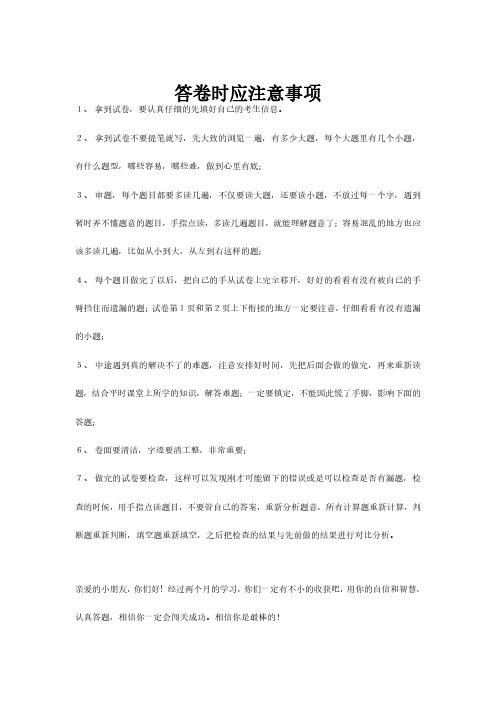
答卷时应注意事项1、拿到试卷,要认真仔细的先填好自己的考生信息。
2、拿到试卷不要提笔就写,先大致的浏览一遍,有多少大题,每个大题里有几个小题,有什么题型,哪些容易,哪些难,做到心里有底;3、审题,每个题目都要多读几遍,不仅要读大题,还要读小题,不放过每一个字,遇到暂时弄不懂题意的题目,手指点读,多读几遍题目,就能理解题意了;容易混乱的地方也应该多读几遍,比如从小到大,从左到右这样的题;4、每个题目做完了以后,把自己的手从试卷上完全移开,好好的看看有没有被自己的手臂挡住而遗漏的题;试卷第1页和第2页上下衔接的地方一定要注意,仔细看看有没有遗漏的小题;5、中途遇到真的解决不了的难题,注意安排好时间,先把后面会做的做完,再来重新读题,结合平时课堂上所学的知识,解答难题;一定要镇定,不能因此慌了手脚,影响下面的答题;6、卷面要清洁,字迹要清工整,非常重要;7、做完的试卷要检查,这样可以发现刚才可能留下的错误或是可以检查是否有漏题,检查的时候,用手指点读题目,不要管自己的答案,重新分析题意,所有计算题重新计算,判断题重新判断,填空题重新填空,之后把检查的结果与先前做的结果进行对比分析。
亲爱的小朋友,你们好!经过两个月的学习,你们一定有不小的收获吧,用你的自信和智慧,认真答题,相信你一定会闯关成功。
相信你是最棒的!2020人教新目标九年级第四单元语法练习(有答案)单项选择1.The school leader advised the parents to talk with him _____ person.A. forB. withC. inD. of2.—Yao Ming is good at basketball. He is my favourite player.—Yes.Everyone in China is proud him.A. ofB. forC. withD. to3.Mrs Liang is old enough to herself. Don't worry about her.A. take part inB. take care ofC. take careD. take place4.Doctors of our school advise us masks on such bad days.A. wearB. wearingC. to wearD. worn5. -- Mum, I did best in our group discussion in school today .---Well done!I ___ you.A. am mad atB. am patient withC. am proud ofD. was patient with6.Nobody believes that this boy can paint such a nice picture.A. five years oldB. five-years-oldC. five-year-oldD. five year old7.I used papers and watch TV after dinner.But now I'm a walk with my father.A. to read;used to takeB. reading;used to takingC. to read;used for takingD. to read;used to taking8.They used to play soccer, _____?A. don’t theyB. do theyC. didn’t theyD. did they9.Some students think that England and Scotland a better understanding of eachother.They belong to one family.A require B. review C. receive D.repeat.10.—I can hardly believe my eyes. Is that you, Lily?—Yes. It has been almost 10 years ________ we were together.A. sinceB. beforeC. afterD. until11. The number of books in the bookshop is about 20,000 and a number of themabout science.A. isB. wasC. areD. Were12.—Lucy won first prize in yesterday's dancing competition in her school.—Really? Then her mother must be ________ her.A. mad atB. worried aboutC. interested inD. proud of13.—Joy, you got to school by taxi?—Oh, I ______________ take a taxi to school, but my bike needs repairing today.A. usuallyB. sometimesC. neverD. seldom14. —It’s necessary and important for the students at school to join the Clean Plate Campaign. —Sure. We should try to _______ all the food that we’ve ordered.A. give upB. eat upC. turn upD. show up15. My grandmother ______a lot of changes in Dongguan since she came here .A. seesB. can seeC. will seeD. has seen16.-- There was one-hour interview with the super football star C. Ronaldo on CCTV 5 last night.-- Yes. C. Ronaldo shared a lot of his experience during interview.A. a; theB. the; theC. a; anD. the; an17. ---- Baseball is a popular game among students in Taipei---- Really? But it is unpopular in our city. Students ___ play it.A. oftenB. seldomC. usuallyD. always18. Nobody can’t tell when the house was built _______, but it must be very old.A. exactlyB. differentlyC. quicklyD. Simply19.—Look! The goldfish is dying in the water.—What a pity! This kind of goldfish________a lot of care and attention.A. hasB. offersC. requiresD. receives20.-- John is really a great grandfather.-- Sure, he is. He spends much time teaching his everything helpful.A. sonB. grandsonC. neighborD. friend21.-- Mr Lu is really good at telling jokes. This makes him a popular teacher.-- You’ve got the point. Students all like teachers in school.A. kindB. carefulC. humorousD. polite22.-- You should say sorry to your brother for the mistake you made, Tom.-- I don’t to meet his eyes.A. needB. haveC. refuseD. dare23.-- Guangzhou Evergrande is really a super team in Asia.-- Yes. We were so when they won the Asian Champions League last year.A. proudB. afraidC. surprisedD. worried24.-- Mr Liu said he teaching English because he loved children and was goodwith them.-- Yes. And his love for children and teaching makes him a great teacher.A. turned upB. gave upC. took upD. set up25.I was used to living in this city. But I still miss my old friends in Shenzhen________.A. in timeB. at the same timeC. from time to timeD. on time26. ---Would you like to watch Transformer 4 in the IMAX theater with me?--- I’d love to, I have watched it twice.A. ifB. sinceC. becauseD. even though27.-- Do you often call your friends?-- No. I use WeChat more often, but I e-mail my friends.A. have toB. would like toC. used toD. get to28. ---- This park used to be full of trees, ___ it?---- Yes. But now it has turned into buildings.A. didB. didn’tC. wasD. wasn’t29.-- I shall go on holiday to African countries next month.-- Really? Then don’t miss . This is a wonderful country.A. B. C. D.30. —Joy, can you tell me ________?— Paul? I haven’t seen him for years. He used to be a shy and quiet boy.A. what is Paul likeB. what Paul is likeC. what does Paul likeD. what Paul likes31.Mr.Luo always keeps at the meeting,and he never gives his opinions.A. seriousB. activeC. excitedD. silent32.Mrs Black is good teacher that she often makes her class lively and interesting .A. soB. suchC. such aD. so a33.This block __________a factory but now it is a park.A. used to beingB. used to beC. is used toD. using to be34.None of them talked. They finished their homework in_________.A. silenceB. orderC. placeD. public35.Little Lucy the room,because it’s too dark outside.A. dare not leaveB. dare leaveC. dare to leaveD. dare not to leave36.—If you listen carefully to this piece of music,you can hear a piano in the .—Really?A. backgroundB. crowdC. speechD. examination37.— a large lake here,but now we can see many tall buildings.—Yes.Everything has changed.A. There used to beB. There used to haveC. There usedn’t to beD. There usedn’t to have38.Zhang Yonghao is very busy these days, for she has a lot of problems to .A. deal withB. keep up withC. agree withD. come up with39.In our school library there a number of books on science,and in these years the number of them growing larger and larger.A. are;isB. is;areC. are;areD. is;is40.—Don’t smoke any more. It’s bad for your health.—I’m trying to ________.It’s really hard, you know.A. turn it onB. put it offC. give it upD. take it out41.Sa Beining is a great reporter. He has________many famous people.A. discoveredB. suggestedC. influencedD. interviewed42.The flowers some water because they haven’t been watered for a few days.A. gainB. requestC. remainD. require43.—You didn’t use to play soccer, _______you?— ,and I often played after school with my friends.A. did;YesB. didn’t;NoC. didn’t;YesD. did;No14.—Hi,Alex!I won the first prize in the English Speech Contest.—Congratulations! And I guess your parents must_________you.A. be mad atB. be proud ofC. be proud inD. be impolite to45. —I want to know more __________about how to use this phrase.—You can look it up in the dictionary.A. mostlyB. exactlyC. nearlyD. hardly46..—Did you play basketball yesterday?—Yes.But I play basketball these days because my right foot hurts.A. usuallyB. alwaysC. neverD. seldom47. he is disabled,he doesn’t depend on others .A. BecauseB. ThoughC. AsD. Since48.After meal,we made a final ______that we would help the poor children in the school.A. ideaB. decisionC. ruleD. opinion49.Doctors advise old people in the open air on such hazy(雾霾的) days.A. exerciseB. exercisingC. to exerciseD. not to exercise50.Hero Pie team finally the team from No.7 Middle School and the final match.A. beat;wonB. won;beatC. beat;beatD. won;won参考答案1-5CABCC 6-10CDCAA 11-15CDDBD 16-20ABACB 21-25CDACC26-30DCBDB 31-35DCBAA 36-40AAAAC 41-45DDABB 46-50DBBDA。
人教版九年级全册Unit4单词+短语+句子默写(含答案)
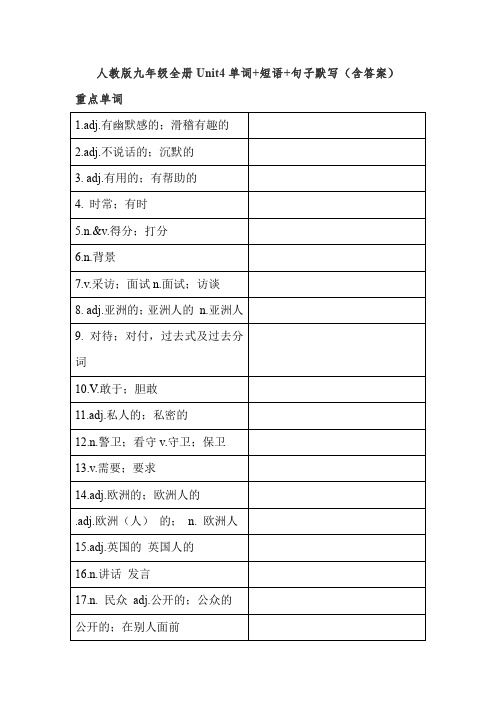
11.adj.私人的;私密的
12.n.警卫;看守v.守卫;保卫
13.v.需要;要求
14.adj.欧洲的;欧洲人的
.adj.欧洲(人)的;n.欧洲人
15.adj.英国的英国人的
16.n.讲话发言
17.n.民众adj.公开的;公众的
公开的;在别人面前
18. n.蚂蚁
19v.&n.影响
92.通向成功的道路
30.the road to success
93.考虑
31.think about…
94.想起
32.thi.fight on
96.大量的…,许多…
34.a number of …
97.…的数量
35.the number of …
98.关于欧洲历史的书
7.当他是一个小男孩儿时,他几乎没有引起任何的问题。
8.李文的不幸开始影响他的学业。
9. “自从我们上次看到我们的小学同学已经3年了。”或“我们已经3年没有看到我们的小学同学了
参考答案
单词
1.adj.有幽默感的;滑稽有趣的
humorou /hju:mərəs/
2.adj.不说话的;沉默的
silent /sailənt/
7.当他是一个小男孩儿时,他几乎没有引起任何的问题。
When he was a little boy, he seldom caused any problems.
8.李文的不幸开始影响他的学业。
Li Wen’s unhappiness began to influence his schoolwork.
119.擅长于…
57.play well in …= be good at …= do well in…
人教版go for it初中英语九年级第四单元Unit 4同步内容精讲精练(含过关卷)
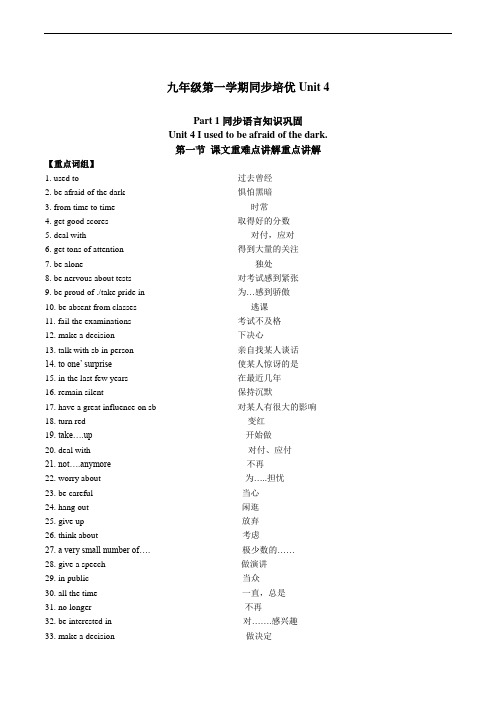
九年级第一学期同步培优Unit 4Part 1同步语言知识巩固Unit 4 I used to be afraid of the dark.第一节课文重难点讲解重点讲解【重点词组】1. used to 过去曾经2. be afraid of the dark 惧怕黑暗3. from time to time 时常4. get good scores 取得好的分数5. deal with 对付,应对6. get tons of attention 得到大量的关注7. be alone 独处8. be nervous about tests 对考试感到紧张9. be proud of ./take pride in 为…感到骄傲10. be absent from classes 逃课11. fail the examinations 考试不及格12. make a decision 下决心13. talk with sb in person 亲自找某人谈话14. to one’ surprise使某人惊讶的是15. in the last few years 在最近几年16. remain silent 保持沉默17. have a great influence on sb 对某人有很大的影响18. turn red 变红19. take….up 开始做20. deal with 对付、应付21. not….anymore 不再22. worry about 为…..担忧23. be careful 当心24. hang out 闲逛25. give up 放弃26. think about 考虑27. a very small number of…. 极少数的……28. give a speech 做演讲29. in public 当众30. all the time 一直,总是31. no longer 不再32. be interested in 对…….感兴趣33. make a decision 做决定34. in person 亲自35. change one’s life 改变某人的生活36. even though 尽管37. take care of 照顾38. think of 关心、想着39. pay attention to 对…..注意,留心40. one of…… …….之一【用法集萃】1. used to do sth. 过去常常做某事2. be afraid of doing sth. 害怕做某事3. give up doing sth. 放弃做某事4. have to do sth. 必须做某事5. make sb. do sth. 让某人做某事6. try to do sth. 尽力做某事7. adj. + enough to do sth. 足够……而能做某事8. be prepared to do sth. 准备做某事9. see sb. doing sth. 看见某人在做某事10. take up doing sth. 开始做某事11. begin to do sth. 开始做某事12. require sb. to do sth. 要求某人做某事13. decide to do sth. 决定做某某14. make a decision to do sth. 决定做某事15. It’s hard to believe that…… 很难相信……….16. It has been + 一段时间+ since + 从句自从……以来已经有很长的时间了17. dare to do sth. 敢于做某事18. It’s + adj. + for sb. + to do sth. 对某人来说做某事是……的【重点句式】1. ---You used to be short, didn’t you? -你过去个子矮,是吗?---Yes, I did. 是的,我是2. ---What’s he like now? ---He’s tall now.---她现在是什么样?---她现在很高。
人教版九年级英语unit 4重点短语句型语法+配套试题(答案)
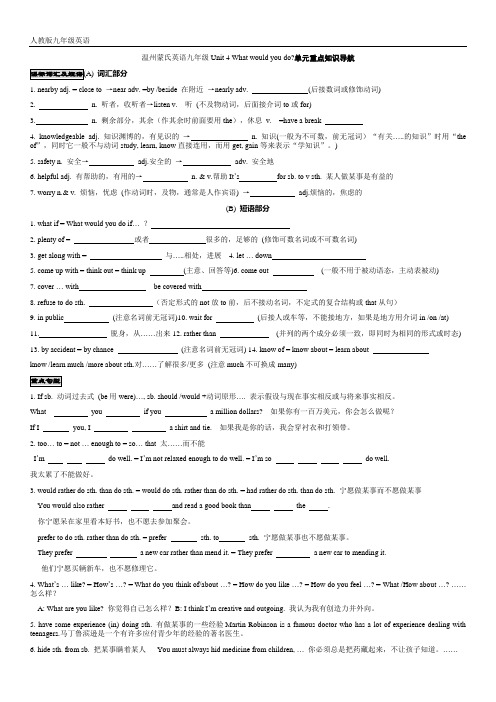
温州蒙氏英语九年级Unit 4 What would you do?单元重点知识导航词汇部分1. nearby adj. = close to →near adv. =by /beside 在附近→nearly adv. (后接数词或修饰动词)2. n. 听者,收听者→listen v.听(不及物动词,后面接介词to或for)3. n. 剩余部分,其余(作其余时前面要用the),休息v.=have a break4. knowledgeable adj. 知识渊博的,有见识的→n. 知识(一般为不可数,前无冠词)“有关…..的知识”时用“the of”,同时它一般不与动词study, learn, know直接连用,而用get, gain等来表示“学知识”。
)5. safety n. 安全→adj.安全的→adv. 安全地6. helpful adj. 有帮助的,有用的→n. & v.帮助It’s for sb. to v sth. 某人做某事是有益的7. worry n.& v. 烦恼,忧虑(作动词时,及物,通常是人作宾语) →adj.烦恼的,焦虑的(B) 短语部分1. what if = What would you do if…?2. plenty of = 或者很多的,足够的(修饰可数名词或不可数名词)3. get along with = 与…..相处,进展4. let … down5. come up with = think out = think up (主意、回答等)6. come out (一般不用于被动语态,主动表被动)7. cover … with be covered with8. refuse to do sth. (否定形式的not放to前,后不接动名词,不定式的复合结构或that从句)9. in public (注意名词前无冠词)10. wait for (后接人或车等,不能接地方,如果是地方用介词in /on /at) 11. 脱身,从……出来12. rather than (并列的两个成分必须一致,即同时为相同的形式或时态) 13. by accident = by chance (注意名词前无冠词) 14. know of = know about = learn aboutknow /learn much /more about sth.对……了解很多/更多(注意much不可换成many)1. If sb. 动词过去式(be用were)…, sb. should /would +动词原形…. 表示假设与现在事实相反或与将来事实相反。
初中英语 人教九年级Unit 4 单元语法 讲解及练习 (含答案)
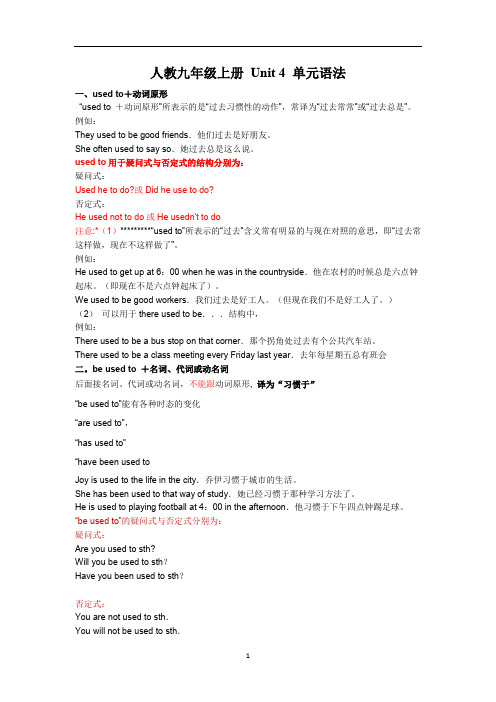
人教九年级上册Unit 4 单元语法一、used to+动词原形“used to +动词原形”所表示的是“过去习惯性的动作”,常译为“过去常常”或“过去总是”。
例如:They used to be good friends.他们过去是好朋友。
She often used to say so.她过去总是这么说。
used to用于疑问式与否定式的结构分别为:疑问式:Used he to do?或Did he use to do?否定式:He used not to do或He usedn't to do注意:*(1)*********“used to”所表示的“过去”含义常有明显的与现在对照的意思,即“过去常这样做,现在不这样做了”。
例如:He used to get up at 6:00 when he was in the countryside.他在农村的时候总是六点钟起床。
(即现在不是六点钟起床了)。
We used to be good workers.我们过去是好工人。
(但现在我们不是好工人了。
)(2)可以用于there used to be...结构中,例如:There used to be a bus stop on that corner.那个拐角处过去有个公共汽车站。
There used to be a class meeting every Friday last year.去年每星期五总有班会二。
be used to +名词、代词或动名词后面接名词、代词或动名词,不能跟动词原形,译为“习惯于”“be used to”能有各种时态的变化“are used to”,“has used to”“have been us ed toJoy is used to the life in the city.乔伊习惯于城市的生活。
She has been used to that way of study.她已经习惯于那种学习方法了。
Unit4知识点练习人教版英语九年级全册
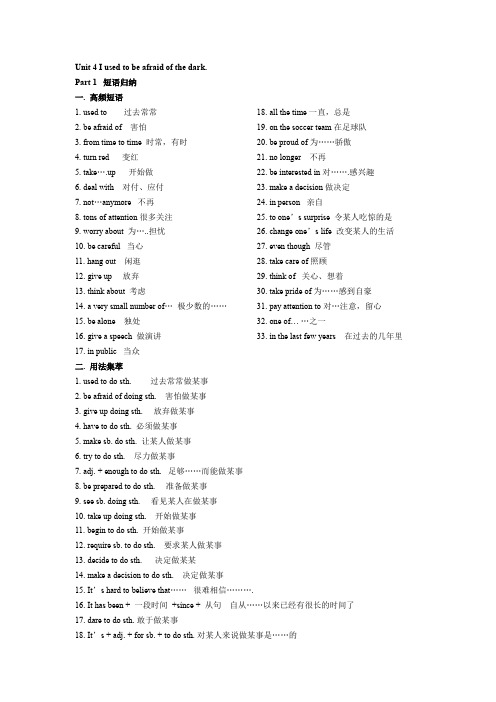
Unit 4I used to be afraid of the dark. Part 1短语归纳一. 高频短语1. used to过去常常2. be afraid of害怕3. from time to time时常,有时4. turn red变红5. take….up开始做6. deal with对付、应付7. not…anymore不再8. tons of attention很多关注9. worry about为…..担忧10. be careful当心11. hang out闲逛12. give up放弃13. think about 考虑14. a very small number of…极少数的……15. be alone独处16. give a speech 做演讲17. in public当众18. all the time一直,总是19. on the soccer team在足球队20. be proud of为……骄傲21. no longer不再22. be interested in对…….感兴趣23. make a decision做决定24. in person亲自25. to one’s surprise 令某人吃惊的是26. change one’s life 改变某人的生活27. even though 尽管28. take care of照顾29. think of关心、想着30. take pride of为……感到自豪31. pay attention to对…注意,留心32. one of……之一33. in the last few years在过去的几年里二. 用法集萃1. used to do sth.过去常常做某事2. be afraid of doing sth.害怕做某事3. give up doing sth.放弃做某事4. have to do sth.必须做某事5. make sb. do sth.让某人做某事6. try to do sth.尽力做某事7. adj. + enough to do sth.足够……而能做某事8. be prepared to do sth.准备做某事9. see sb. doing sth.看见某人在做某事10. take up doing sth.开始做某事11. begin to do sth.开始做某事12. require sb. to do sth.要求某人做某事13. decide to do sth.决定做某某14. make a decision to do sth.决定做某事15. It’s hard to believe that……很难相信……….16. It has been + 一段时间+since + 从句自从……以来已经有很长的时间了17. dare to do sth.敢于做某事18. It’s + adj.+ for sb. + to do sth.对某人来说做某事是……的Part 2重点语法used to 的用法1. 基本用法used to do sth.的意思是“过去经常做某事”,指过去经常发生的动作,但现在不再发生了,其中的to是不定式符号,不是介词,所以其后接动词原形(不接动名词)。
Unit4 重难点整理练习 人教版英语九年级全册
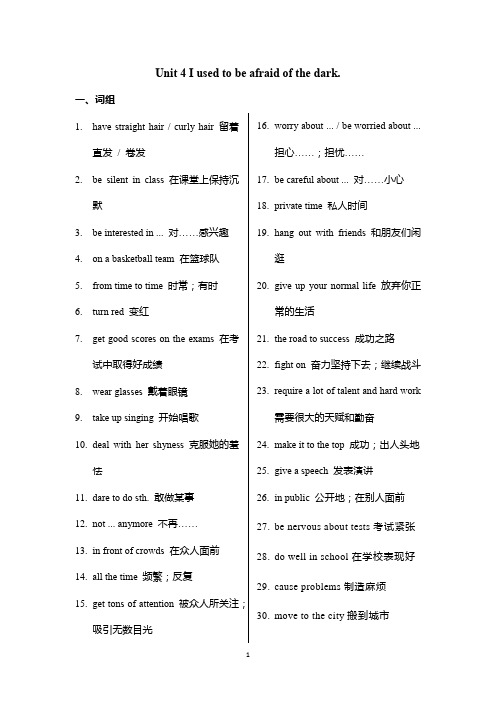
Unit 4 I used to be afraid of the dark.一、词组1.have straight hair / curly hair 留着直发/ 卷发2.be silent in class 在课堂上保持沉默3.be interested in ... 对……感兴趣4.on a basketball team 在篮球队5.from time to time 时常;有时6.turn red 变红7.get good scores on the exams 在考试中取得好成绩8.wear glasses 戴着眼镜9.take up singing 开始唱歌10.deal with her shyness 克服她的羞怯11.dare to do sth. 敢做某事12.not ... anymore 不再……13.in front of crowds 在众人面前14.all the time 频繁;反复15.get tons of attention 被众人所关注;吸引无数目光16.worry about ... / be worried about ...担心……;担忧……17.be careful about ... 对……小心18.private time 私人时间19.hang out with friends 和朋友们闲逛20.give up your normal life 放弃你正常的生活21.the road to success 成功之路22.fight on 奋力坚持下去;继续战斗23.require a lot of talent and hard work需要很大的天赋和勤奋24.make it to the top 成功;出人头地25.give a speech 发表演讲26.in public 公开地;在别人面前27.be nervous about tests 考试紧张28.do well in school 在学校表现好29.cause problems 制造麻烦30.move to the city 搬到城市31.look for jobs 找工作32.take care of sb. 照顾某人33.miss his parents 想念他的父母34.feel lonely and unhappy 感到孤独和不开心35.influence his schoolwork 影响他的学业36.be absent from classes 缺课;缺勤37.fail his examinations 他的考试不及格38.make the decision to do sth. 决定做某事39.make friends 交朋友40.leave the school 离开学校41.advise sb. to do sth. 建议某人做某事42.in person 亲身;亲自43.take a 24-hour train ride 乘坐24个小时的火车44.even though 即使;虽然45.think of sb. 想起某人46.take pride in / be proud of为……骄傲;为……感到自豪47.become active in many otheractivities 在许多别的活动中变得积极48.have a long talk 长谈49.send sb. to a boarding school 将某人送到一所寄宿学校二、语法ed to的用法1)用法:used to是固定结构,意为:“___________________”,表示过去某种习惯性、经常性的动作或过去存在的某种状态。
(必考题)初中英语九年级全册Unit 4知识点复习(答案解析)
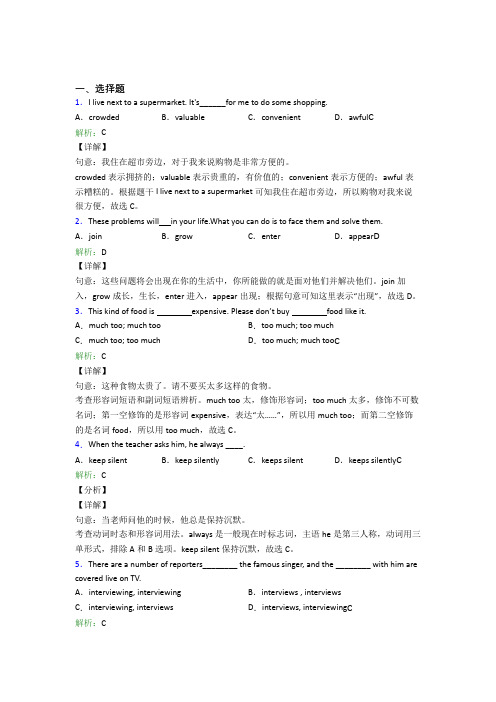
一、选择题1.I live next to a supermarket. It's______for me to do some shopping.A.crowded B.valuable C.convenient D.awful C解析:C【详解】句意:我住在超市旁边,对于我来说购物是非常方便的。
crowded表示拥挤的;valuable表示贵重的,有价值的;convenient表示方便的;awful表示糟糕的。
根据题干I live next to a supermarket可知我住在超市旁边,所以购物对我来说很方便,故选C。
2.These problems will in your life.What you can do is to face them and solve them. A.join B.grow C.enter D.appear D解析:D【详解】句意:这些问题将会出现在你的生活中,你所能做的就是面对他们并解决他们。
join加入,grow成长,生长,enter 进入,appear出现;根据句意可知这里表示“出现”,故选D。
3.This kind of food is expensive. Please don’t buy food like it.A.much too; much too B.too much; too muchC.much too; too much D.too much; much too C解析:C【详解】句意:这种食物太贵了。
请不要买太多这样的食物。
考查形容词短语和副词短语辨析。
much too太,修饰形容词;too much太多,修饰不可数名词;第一空修饰的是形容词expensive,表达“太……”,所以用much too;而第二空修饰的是名词food,所以用too much,故选C。
4.When the teacher asks him, he always ____.A.keep silent B.keep silently C.keeps silent D.keeps silently C解析:C【分析】【详解】句意:当老师问他的时候,他总是保持沉默。
2020人教版英语九年级上册Unit 4重点词汇、语法自测(附答案)
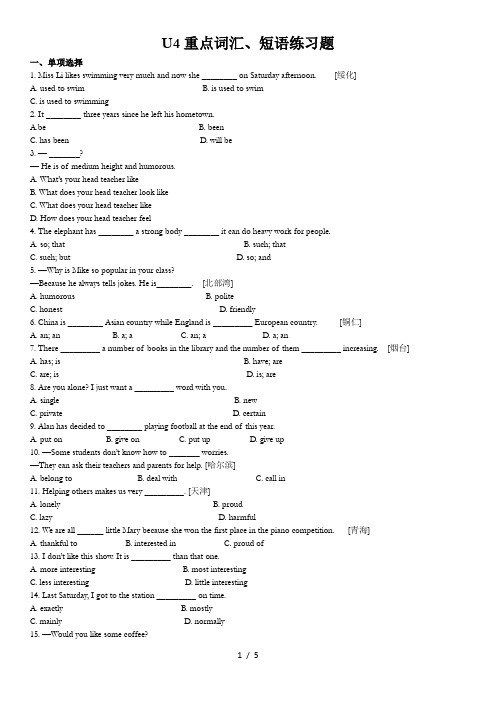
U4重点词汇、短语练习题一、单项选择1. Miss Li likes swimming very much and now she ________ on Saturday afternoon. [绥化]A. used to swimB. is used to swimC. is used to swimming2. It ________ three years since he left his hometown.A.beB. beenC. has beenD. will be3. — _______?— He is of medium height and humorous.A. What’s your head teacher likeB. What does your head teacher look likeC. What does your head teacher likeD. How does your head teacher feel4. The elephant has ________ a strong body ________ it can do heavy work for people.A. so; thatB. such; thatC. such; butD. so; and5. —Why is Mike so popular in your class?—Because he always tells jokes. He is________. [北部湾]A. humorousB. politeC. honestD. friendly6. China is ________ Asian country while England is _________ European country. [铜仁]A. an; anB. a; aC. an; aD. a; an7. There _________ a number of books in the library and the number of them _________ increasing. [烟台]A. has; isB. have; areC. are; isD. is; are8. Are you alone? I just want a _________ word with you.A. singleB. newC. privateD. certain9. Alan has decided to ________ playing football at the end of this year.A. put onB. give onC. put upD. give up10. —Some students don’t know how to _______ wo rries.—They can ask their teachers and parents for help. [哈尔滨]A. belong toB. deal withC. call in11. Helping others makes us very _________. [天津]A. lonelyB. proudC. lazyD. harmful12. We are all ______ little Mary because she won the first place in the piano competition. [青海]A. thankful toB. interested inC. proud of13. I don’t like this show. It is _________ than that one.A. more interestingB. most interestingC. less interestingD. little interesting14. Last Saturday, I got to the station _________ on time.A. exactlyB. mostlyC. mainlyD. normally15. —Would you like some coffee?—No, thanks. I _____ drink coffee. [徐州]A. seldomB. oftenC. onlyD. always二、根据句意或括号内所给词的适当形式填空1. She is ________(friend) to everyone. We all like her.2. Tom is a ________(help) boy. He is ready to help others when they are in trouble.3. He is used to ________(have) a cup of tea first after getting up. [常州]4. We can see some fishes ____________(swim)in the river now.5. They ____________(know) each other since they were children.6. Is Russia a __________ (Europe) country?7. How do you dare _________ (say) that to your teacher?8. His hard work brought him great ___________ (succeed) in the end.9. Peng Liyuan gave two wonderful __________ (speak) in English at the United Nations on September 26th,2015.10. You should try to overcome your __________ (shy).11. I don’t like travelling, so I s go anywhere else.12. Tony was sad because he f his math test.13. His father’s words had i on him.14. You can talk about it with Jim in p .15. We all take p in your success.三、根据汉语意思完成句子1. 我打算学习摄影。
九年级人教版英语4单元重点短语句型及题型
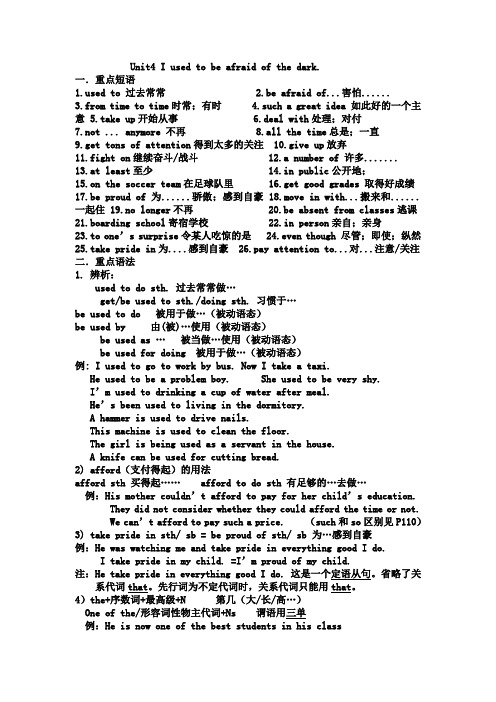
Unit4 I used to be afraid of the dark.一.重点短语ed to 过去常常2.be afraid of...害怕......3.from time to time时常;有时4.such a great idea 如此好的一个主意5.take up开始从事6.deal with处理;对付7.not ... anymore 不再 8.all the time总是;一直9.get tons of attention得到太多的关注 10.give up放弃11.fight on继续奋斗/战斗 12.a number of 许多....... 13.at least至少 14.in public公开地;15.on the soccer team在足球队里 16.get good grades 取得好成绩17.be proud of 为......骄傲;感到自豪 18.move in with...搬来和......一起住 19.no longer不再 20.be absent from classes逃课21.boarding school寄宿学校 22.in person亲自;亲身23.to one’s surprise令某人吃惊的是 24.even though 尽管;即使;纵然25.take pride in为....感到自豪 26.pay attention to...对...注意/关注二.重点语法1. 辨析:used to do sth. 过去常常做…get/be used to sth./doing sth. 习惯于…be used to do 被用于做…(被动语态)be used by 由(被)…使用(被动语态)be used as …被当做…使用(被动语态)be used for doing 被用于做…(被动语态)例: I used to go to work by bus. Now I take a taxi.He used to be a problem boy. She used to be very shy.I’m used to drinking a cup of water after meal.He’s been used to living in the dormitory.A hammer is used to drive nails.This machine is used to clean the floor.The girl is being used as a servant in the house.A knife can be used for cutting bread.2) afford(支付得起)的用法afford sth 买得起…… afford to do sth 有足够的…去做…例:His mother couldn’t afford to pay for her child’s education.They did not consider whether they could afford the time or not.We can’t afford to pay such a price. (such和so区别见P110)3) take pride in sth/ sb = be proud of sth/ sb 为…感到自豪例:He was watching me and take pride in everything good I do.I take pride in my child. =I’m proud of my child.注:He take pride in everything good I do. 这是一个定语从句。
最新中考英语人教九全U3—4重点短语句型和练习及答案
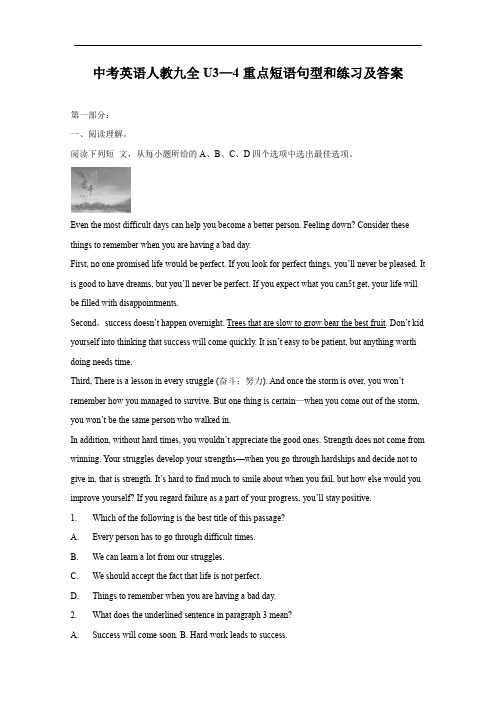
中考英语人教九全U3—4重点短语句型和练习及答案第一部分:一、阅读理解。
阅读下列短文,从每小题所给的A、B、C、D四个选项中选出最佳选项。
Even the most difficult days can help you become a better person. Feeling down? Consider these things to remember when you are having a bad day.First, no one promised life would be perfect. If you look for perfect things, you’ll never be pleased. It is good to have dreams, but you’ll never be perfect. If you expect what you can5t get, your life will be filled with disappointments.Second,success doesn’t happen overnight. Trees that are slow to grow bear the best fruit. Don’t kid yourself into thinking that success will come quickly. It isn’t easy to be patient, but anything worth doing needs time.Third, There is a lesson in every struggle (奋斗;努力). And once the storm is over, you won’t remember how you managed to survive. But one thing is certain—when you come out of the storm, you won’t be the same person who walked in.In addition, without hard times, you wouldn’t appreciate the good ones. Strength does not come from winning. Your struggles develop your strengths—when you go through hardships and decide not to give in, that is strength. It’s hard to find much to smile about when you fail, but how else would you improve yourself? If you regard failure as a part of your progress, you’ll stay positive.1. Which of the following is the best title of this passage?A. Every person has to go through difficult times.B. We can learn a lot from our struggles.C. We should accept the fact that life is not perfect.D. Things to remember when you are having a bad day.2. What does the underlined sentence in paragraph 3 mean?A. Success will come soon.B. Hard work leads to success.C. Success requires patience.D. Being slow is the first step to success.3. After experiencing the struggle, one will __________.A. never be the same person before the experienceB. no longer remember how he has learnedC. forget how he has managed to surviveD. never experience the similar situation in the future4. What can we infer (推断) from paragraph 5?A. Hard times make us lose heart and be short of courage.B. Perseverance (毅力) in time of hardships develops our strengths.C. Smiles when you fail will not help to improve yourself.D. We should try to avoid failures in the future.参考答案1—4、DCAC二、首字母填空。
- 1、下载文档前请自行甄别文档内容的完整性,平台不提供额外的编辑、内容补充、找答案等附加服务。
- 2、"仅部分预览"的文档,不可在线预览部分如存在完整性等问题,可反馈申请退款(可完整预览的文档不适用该条件!)。
- 3、如文档侵犯您的权益,请联系客服反馈,我们会尽快为您处理(人工客服工作时间:9:00-18:30)。
温州蒙氏英语九年级Unit 4 What would you do?单元重点知识导航词汇部分1. nearby adj. = close to →near adv. =by /beside 在附近→nearly adv. (后接数词或修饰动词)2. n. 听者,收听者→listen v.听(不及物动词,后面接介词to或for)3. n. 剩余部分,其余(作其余时前面要用the),休息v.=have a break4. knowledgeable adj. 知识渊博的,有见识的→n. 知识(一般为不可数,前无冠词)“有关…..的知识”时用“the of”,同时它一般不与动词study, learn, know直接连用,而用get, gain等来表示“学知识”。
)5. safety n. 安全→adj.安全的→adv. 安全地6. helpful adj. 有帮助的,有用的→n. & v.帮助It’s for sb. to v sth. 某人做某事是有益的7. worry n.& v. 烦恼,忧虑(作动词时,及物,通常是人作宾语) →adj.烦恼的,焦虑的(B) 短语部分1. what if = What would you do if…?2. plenty of = 或者很多的,足够的(修饰可数名词或不可数名词)3. get along with = 与…..相处,进展4. let … down5. come up with = think out = think up (主意、回答等)6. come out (一般不用于被动语态,主动表被动)7. cover … with be covered with8. refuse to do sth. (否定形式的not放to前,后不接动名词,不定式的复合结构或that从句)9. in public (注意名词前无冠词)10. wait for (后接人或车等,不能接地方,如果是地方用介词in /on /at) 11. 脱身,从……出来12. rather than (并列的两个成分必须一致,即同时为相同的形式或时态) 13. by accident = by chance (注意名词前无冠词) 14. know of = know about = learn aboutknow /learn much /more about sth.对……了解很多/更多(注意much不可换成many)1. If sb. 动词过去式(be用were)…, sb. should /would +动词原形…. 表示假设与现在事实相反或与将来事实相反。
What you if you a million dollars? 如果你有一百万美元,你会怎么做呢?If I you, I a shirt and tie. 如果我是你的话,我会穿衬衣和打领带。
2. too… to = not … enough to = so… that 太……而不能I’m do well. = I’m not relaxed enough to do well. = I’m so do well.我太累了不能做好。
3. would rather do sth. than do sth. = would do sth. rather than do sth. = had rather do sth. than do sth. 宁愿做某事而不愿做某事You would also rather and read a good book than the .你宁愿呆在家里看本好书,也不愿去参加聚会。
prefer to do sth. rather than do sth. = prefer sth. to sth. 宁愿做某事也不愿做某事。
They prefer a new car rather than mend it. = They prefer a new car to mending it.他们宁愿买辆新车,也不愿修理它。
4. What’s … like? = How’s …? = What do you think of/about …? = How do you like …? = How do you feel …? = What /How about …? ……怎么样?A: What are you like? 你觉得自己怎么样?B: I think I’m creative and outgoing. 我认为我有创造力并外向。
5. have some experience (in) doing sth. 有做某事的一些经验Martin Robinson is a famous doctor who has a lot of experience dealing with teenagers.马丁鲁滨逊是一个有许多应付青少年的经验的著名医生。
6. hide sth. from sb. 把某事瞒着某人You must always hid medicine from children, …你必须总是把药藏起来,不让孩子知道。
……状语从句在初中阶段要求掌握以下的状语从句:时间状语从句:是由when, as, while, after, before, since, until, as soon as 等从属连词引导的状语从句。
时间状语从句中的谓语动词不能用一般将来时,只能用一般现在时表示将来发生的动作或存在的状态。
如年山东济南市中考试题:He doesn’t tell me when he ______. I’ll telephone you as soon as he ______.A. will come, comesB. will come, will comeC. comes, will comeD. comes, comes (答案为A)再如年青岛市中考试题:He didn’t tell me anything ______ he left.A. untilB. beforeC. afterD. since (答案为B)原因状语从句:because, since, as和for都表示原因。
常常令我们不知该用哪个好。
我们来比较一下。
because语势最强,回答why提出的问题,用来说明人所不知的原因。
当能够很明显的看出原因或人们已知原因,就用as或since,同时不能与so连用。
如:I don't like that coat, because the color looks terrible. 由because引导的从句如果放在句末,且前面有逗号,则可以用for来代替。
但如果不是说明直接原因,而是多种情况加以推断,就只能用for。
如:He is not here, because / for his mother is ill. 他今天缺席,因为他病了。
He must be ill, for he is absent today. 他一定病了,所以今天缺席。
目的状语从句:表示目的状语的从句可以由in order that, so that等词引导。
如:You must raise your voice so that/in order that everybody can hear you clearly.结果状语从句:结果状语从句常由so...that 或such...that引导,要掌握和区分这两个句型,首先要了解so和such后面分别跟什么词。
such是形容词,修饰名词或名词词组,so是副词,只能修饰形容词或副词。
so 还可与表示数量的形容词many, few, much, little连用,形成固定搭配。
如:The box is so heavy that I can't carry it.再如年湖北省潜江市仙桃市江汉油田中考试题:Look out! The traffic is ________ fast ________ we can’t cross the street now.A. too; toB. enough; toC. so; thatD. such; that (答案为C)让步状语从句:是由though, although 引导的状语从句。
though, although 和but不能同时使用,但是though 和yet 可连用。
如:Although it rained, they had a good time.由ever if, even though作“即使”讲所引导的状语从句。
例如:We'll make a trip even though the weather is bad. 即使天气不好,我们也要去远足。
由"no matter +疑问词" 或"疑问词+后缀ever" 所构成的状语从句。
例如:No matter what happened, he would not mind. =Whatever happened, he would not mind. 不管发生什么,他不在意。
替换:no matter what = whatever no matter who = whoeverno matter when = whenever no matter where = whereverno matter which = whichever no matter how = however注意:no matter 不能引导主语从句和宾语从句。
比较状语从句:是由than, as…as, not so…as等所引导的状语从句,注意比较的对象必须一致,如:She gets to school earlier than the other students.My books aren’t as interesting as yours.条件状语从句:条件状语从句是由if, unless= if not等引导,if 引导的条件句有真实条件句和非真实条件句两种。
真实条件句中该用将来时的时候,要用一般现在时来代替。
它可以转换为祈使句,and /or clause. 如湖北咸宁市中考试题:I won’t take part in the party _____ Joe invites me. (= Invite me, or I won’t take part in the party.)A. ifB. whenC. unlessD. because (答案为C)再如年潍坊市中考试题:---Does Ted tell me if he _________ next Sunday?---No, he doesn’t. But if he _______, he’ll give you a ring.A. will come, will comeB. comes, will comeC. comes, comesD. will come, comes (答案为D)☆非真实条件句(虚拟语气,不要求)表示说的话不是事实,或者是不可能发生的情况,而是一种愿望、建议或与事实相反的假设等。
